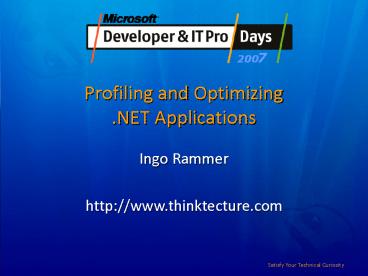Profiling and Optimizing 'NET Applications - PowerPoint PPT Presentation
1 / 33
Title:
Profiling and Optimizing 'NET Applications
Description:
Support and consulting for software architects and developers ... 1200 baud acoustic coupler 'Ping' to New York: 1200 msec. Download of 3,6 GB (Visual Studio) ... – PowerPoint PPT presentation
Number of Views:104
Avg rating:3.0/5.0
Title: Profiling and Optimizing 'NET Applications
1
Profiling and Optimizing.NET Applications
- Ingo Rammer
- http//www.thinktecture.com
2
Ingo Rammer and
- Support and consulting for software architects
and developers - Application Optimization and Tuning
- Developer-Coaching and -Mentoring
- Architecture and Code Reviews
- Prototyping and Architectural Consulting
- http//www.thinktecture.com
- ingo.rammer_at_thinktecture.com
3
Scenario I
ü Architecture ü Design ü Initial Coding and
Load Testing
4
Load Testing Pitfalls
- Its important to test the right thing
- Double-check that network link and client CPUs
are not overloaded - Run test clients in the same LAN as the servers
- Two ways of testing with very different results
- Simulated user load (including think times, etc.)
- Maximum Request Load (no think time, just load)
- Include ramp-up time (step user load)
5
Load Testing in Practice
- Track counters of multiple servers
- Test clients, Web servers, DB servers
- Liebigs Law of the Minimum is applicable here as
well - The scarcest resource will limit growth
- After the resource is identified, take action
6
Scenario II
ü Architecture ü Design ü Coding ü Test ü
Deployment
7
- Users
8
(No Transcript)
9
(No Transcript)
10
- Dont assume anything
11
1st - Trace the Network Interactions
- The wire never lies
- Wireshark/Ethereal (Sniffing)
- TcpTrace (Explicit Port-Forwarding)
- Fiddler, ProxyTrace (HTTP Proxies)
- Caution Some companies do not allow sniffing!
12
Things you might find out
- Overhead you didnt expect
- Authentication, sub-optimal bindings,
- Roundtrips you didnt expect
- Cookies
- Images (check your IE settings!)
- MarshalByRefObject-roundtrips
- General Too many roundtrips, or too big
- Latency vs. Bandwidth
13
2nd - Trace your SQL
- Most SQL today is generated
- DataSets and Adapters
- O/R Mappers
- Suboptimal SQL main reason for scalability probs
- Today's databases are (unfortunately?) very good
- Hide a lot of problems in single-user access
during DEV
14
Invoicing Application Subset
InvoiceItems InvoiceId Itemld ProductId ProductNa
me Quantity Price Status
Invoice InvoiceId InvoiceDate CustomerId Status
SerialNumbers InvoiceID ItemId SerialNumber Statu
s
SerialNumberAudit AuditId EntryDate Username Seri
alNumber Description
15
Invoicing - Requirements
- Cancel (Status2)
- Copy
16
Lessons Learned from SQL Profiling
- DataSets, DataAdapters and O/R Mappers are great
tools - Can simplify more than 80 - 90 of your generic
database access code - BUT Please avoid them in high-load /
high-throughput parts of your application
17
Optimize Your SQL for Transactions
- UPDATE with Foreign Keys
- INSERT INTO ... SELECT
- In the high-load areas of your application. Not
everywhere!
18
Database Locks
- Minimize duration and number of locks
- Dynamic SQL (with parameters) vs. Stored
Procedures - UPDATE only changed rows if possible
- SELECT only the rows you need, join only tables
you need - Possibility changed isolation level (snapshot
isolation or NOLOCK) in statistics if you have to
report from OLTP data - Dont use Sequence-Tables (better go for
Autoincrement/Identity/Guid columns!)
19
The 1 Reason for Deadlocks
20
Indexes help a bit...
- Use Index (TableName)
- Not Index (TableName, NextValue)
- SQL Server An index is only locked when one or
more of the contained fields are locked! - Even snapshot isolation wont help you here
- Please note Oracle sequences behave differently.
They always run without transaction locks.
21
3rd - Memory Profiling
- CLR Profiler 2.0 (free tool)
- Shows how much memory each method allocates
- Not leaks, just allocations
22
Memory Usage
- Important for multi-user applications
- Issue Multiple GC-cycles during one request
- Generative GC
- Short-lived objects end up in generation 2
- You can quickly check this in PerfMon, too!
- .NET CLR Memory/Gen 0 Collections, 1, 2
- 2,5 GB practical maximum for ASP.NET apps on 32
bit systems
23
In-Process Profiling
- Often as a last step
- Reason In-Proc affects only performance
- Reason 2 After eliminating memory hogs, code
will usually be faster anyway - Profiler
- Jetbrains DotTrace
- Redgate ANTS
- Automated QA AQTime
- Compuware DevPartner
24
- I code well, so wheres the scary part?
25
The Scary Facts
- SqlDataSource
- Grid A 23,926,450 Bytes
- Grid B 17,147,255 Bytes
- Grid C 3,325,839 Bytes
- GridView 2,583,207 Bytes
- ObjectDataSource
- GridView 169,551 Bytes
- Grid C 916,769 Bytes
- Manual
- HTML Tables 51,237 Bytes
- w/o ViewState 43,897 Bytes
26
Summary
- Dont assume anything
- Network the wire never lies (auth overhead,
roundtrips, ) - Database generated SQL
- Memory multiple GCs for one request?
- In-Proc Performance as the last step (scale up)
- Dont trust anyone
- It might not be your code, but it could be your
job!
27
(No Transcript)
28
Resources
- Wireshark/Ethereal http//www.wireshark.com
- Fiddler http//www.fiddlertool.com
- TcpTrace, ProxyTrace http//www.pocketsoap.com
- SQL Profiler out of the box
- CLR Profiler 2.0 cryptic link, please google
29
(No Transcript)
30
2006
- DSL, WLAN, MBits,
- Ping to New York 800 msec
- Download of 3,6 GB (Visual Studio)
- 6 Hours
31
Early 90s
- 1200 baud acoustic coupler
- Ping to New York 1200 msec
- Download of 3,6 GB (Visual Studio)
- 347 Days
32
Early 90s
Download 347 Days
Walking 20.000 km 5 km per hour 12 hours per day
? 333 Days
33
2006
- Latency (Ping) 33 improvement
- Bandwidth 138 800 improvement































